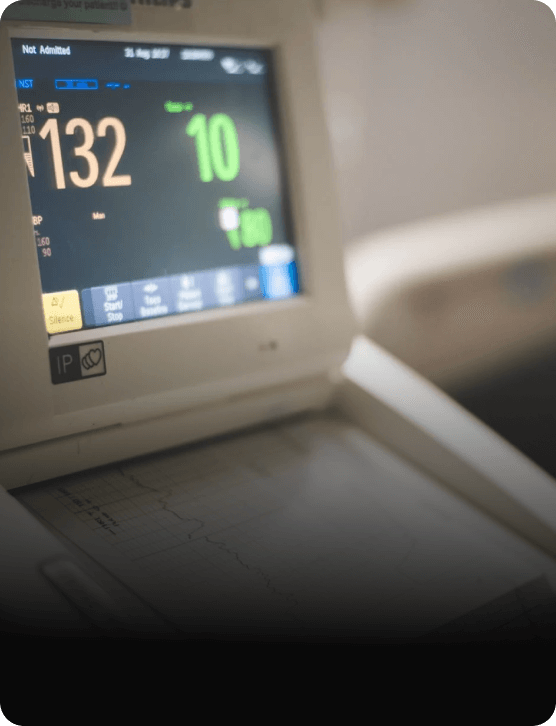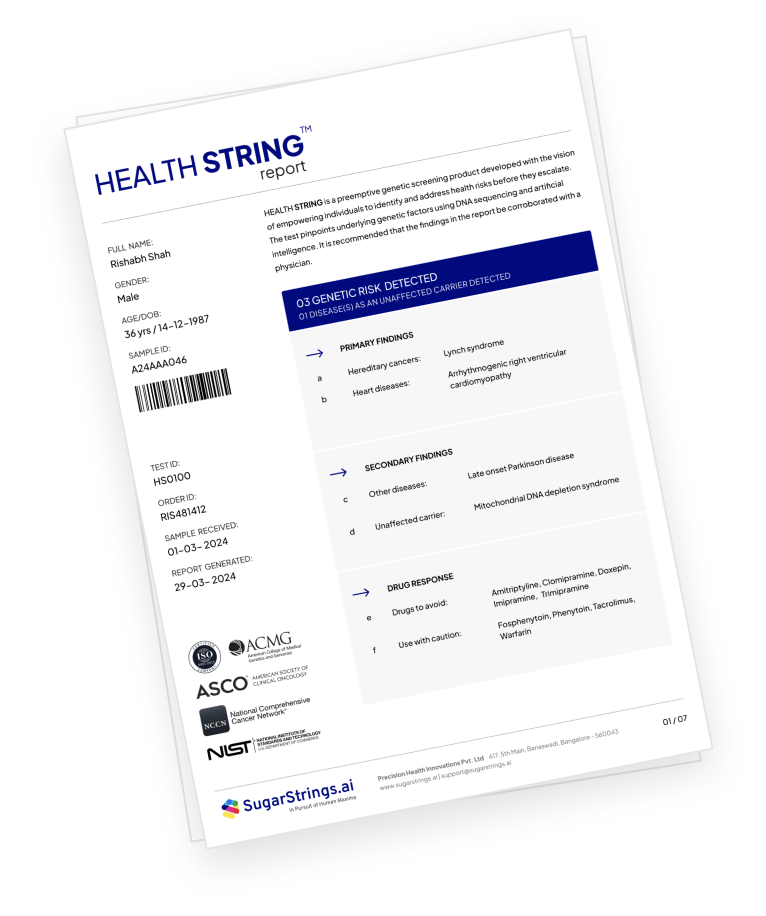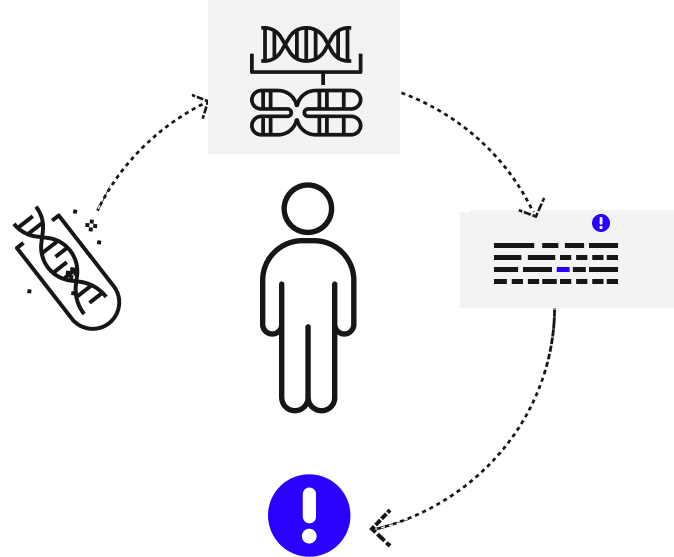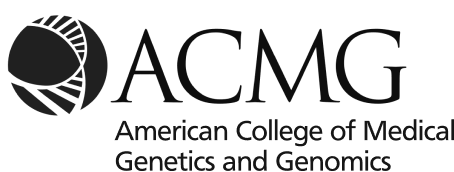Make Informed Health Decisions with Deep DNA Insights
 Preserve
PreserveYour Good Health
 Protect From
Protect FromInheritable Diseases
 Optimised Health
Optimised HealthMonitoring
 Peace of Mind
Peace of Mindvia Proactive Care
Why wait to get sick when diseases can be prevented years before symptoms?
What's Covered in the Test
Hereditary Cancers
Hereditary cancers result from inherited gene mutations that increase the likelihood of developing certain cancers, including breast, ovarian, colorectal, and prostate cancers. Early identification of these genetic predispositions help in taking preventive measures, such as increased screening, lifestyle adjustments, or preventive surgeries, to reduce the chance of developing cancer.
HEALTHSTRING, analyses over 800 cancer causing genes and their mutations, offering the most comprehensive preventive screening available globally.
Blood
Breast
Lung
Mouth
Breast
Lung
Blood
Thyroid
Stomach
Ovary
Prostate
Mouth
Liver
Bone
Brain
Pancreas
Skin
Kidney
Heart
Rectum
Eye
Colon
Throat
Adrenal gland
Blood vessels
Bone marrow
Connective tissue
Gastrointestinal tract
Endocrine system
Endometrium
Esophagus
Gastrointestinal tract
Sebum gland
Gums
Hypothalamus
Lymphoid tissue
Nerves
Pituitary gland
Soft tissue
- Ataxia Telangetasia
- Ataxia Telangetasia-like Disorder
- Bannayan-Riley-Ruvalcaba Syndrome
- Basal Cell Nevus Syndrome
- Birt-Hogg-Dube Syndrome
- Bloom Syndrome
- Breast Cancer
- Carney Complex
- Carney-Stratakis Syndrome
- Chediak-Higashi Syndrome
- Costello Syndrome
- Cowden Syndrome
- Denys-Drash Syndrome
- Endometrial Cancer
- Familial Monocytic Leukemia
- Familial Multiple Glomus Tumors
- Familial Multiple Trichoepithelioma
- Familial Myeloproliferative/Lymphoproliferative Neoplasms
- Familial Osteosarcoma
- Familial Pancreatic Cancer
- Familial Uveal Melanoma
- Fanconi Anemia
- Ferguson-Smith Syndrome
- Gardner Syndrome
- Glioma
- Hemochromatosis
- Hereditary Acute Myeloid Leukemia
- Hereditary Adenomatous Polyposis
- Hereditary Adrenal Hyperplasia
- Hereditary Adrenal Pheochromocytoma
- Hereditary Adrenocortical Cancer
- Hereditary Barrett Esophagus/Esophageal Adenocarcinoma
- Hereditary Bone Dysplasia with Malignant Fibrous Histiocytoma
- Hereditary Breast-Ovarian Cancer
- Hereditary Colorectal Cancer
- Hereditary Desmoid Disease
- Hereditary Epidermodysplasia Verruciformis
- Hereditary Gastric Carcinoma
- Hereditary GIST
- Hereditary Hodgkin Lymphoma
- Hereditary Infantile Hemangioma
- Hereditary Isolated Pituitary Adenoma
- Hereditary Leiomyomatosis & Renal Cell Cancer
- Hereditary Lung Cancer
- Hereditary Malignant Melanoma
- Hereditary Medulloblastoma
- Hereditary Melanoma & Renal Cancer
- Hereditary Neuroblastoma
- Hereditary Paragangliomas
- Hereditary Pleuropulmonary Blastoma
- Hereditary Primary Pigmented Nodular Adrenocortical Disease
- Hereditary Prostate Cancer
- Hereditary Thyroid Cancer
- Hereditary Wilms’ Tumor
- Howel-Evans syndrome
- Hyperparathyroidism-Jaw Tumor Syndrome
- Juvenile Hyaline Fibromatosis
- Juvenile Polyposis Syndrome
- Lhermitte-Duclos syndrome
- Li-Fraumeni Syndrome
- LIG4 Syndrome
- Lymphangioleiomyomatosis
- Lynch Syndrome
- Melanoma and Neural System Tumor Syndrome
- Melanoma-pancreatic Cancer Syndrome
- Mismatch Repair Cancer Syndrome
- Mosaic Variegated Aneuploidy
- Muir-Torre Syndrome
- Multiple Endocrine Neoplasia
- Multiple Exostoses
- Myelodysplastic Syndrome
- Neurofibromatosis
- Nijmegen Breakage Syndrome
- Nijmegen Breakage-like Syndrome
- Noonan Syndrome-like Disorder with or without Juvenile Myelomonocytic AD 24 43 leukemia
- Oligodontia-Colorectal Cancer Syndrome
- Opitz Trigonocephaly Syndrome
- Oral Cancer
- Pallister-Hall Syndrome
- Palmoplantar Keratoderma & Squamous Cell Carcinoma
- Perlman Syndrome
- Peutz-Jeghers Syndrome
- POLD1 & POLE Associated Colorectal Adenomas
- Porphyria Cutanea Tarda
- Proteus Syndrome
- Retinoblastoma
- Rhabdoid Predisposition Syndrome
- Rothmund-Thompson Syndrome
- SC Phocomelia Syndrome
- Schwachman-Diamond Syndrome
- Schwannomatosis
- Seckel Syndrome 1
- Simpson-Golabi-Behmel Syndrome
- TERT Mutation-Associated Haematological Disorders
- Tumor Predisposition Syndrome
- Tyrosinemia
- Von Hippel-Lindau Syndrome
- Werner Syndrome
- Wiskott-Aldrich Syndrome
- Xeroderma Pigmentosum
Not finding what you need?
Not finding what you need?
100% Specificity
achieved with AI/ML.
Absolute, Individualised, Actionable.
Genetic diseases are often progressive and can become life-threatening when triggered by lifestyle or environmental factors. Early risk identification enables proactive prevention.
We analyze all functional regions of the DNA using proprietary, population-agnostic, machine-learning-driven algorithms to detect variations that could lead to diseases.
With the highest sensitivity and specificity in detection, the results are presented in a clinically actionable format, adhering to international guidelines for DNA screening.
Single-base level investigation of genetic risks.
Population-agnostic and evidence based reporting.
Individualised insights, enabling precise health strategies.
Steer your life toward wellness, not illness.


Mutation (DNA Error)
Reveals the root causes and health impact.Mutation
: 3-37020354-C-G ENST0000023 1790.8 c.929C >G p.Thr310Arg
Type
: Missense
Zygosity
: Heterozygous
Inheritance
: Autosomal Dominant
Classification
: Likely Pathogenic
Lynch syndrome is an inherited genetic condition that increases the risk of various types of cancer, particularly colorectal cancer and endometrial cancer. Lynch syndrome is caused by mutations in genes that are responsible for DNA repair...




Sample collection is effortlessly simple!

The preservation of health is easier than the cure of disease.
FAQ
We sequence all the functional regions in your DNA using Next Generation DNA Sequencing technology to identify your unique genetic variants. Our proprietary AI/ML-driven algorithms analyse your DNA to detect genetic factors linked to the covered diseases.
In 4 weeks, you receive a personalised, clinical-grade genetic health report with actionable recommendations.
HEALTHSTRING™ identifies the risk of over 6,000 genetic conditions before disease onset, enabling physicians to develop preventive strategies such as lifestyle changes or medical treatments to avoid adverse health events.
Knowing potential threats in advance can optimise future health screenings, customised to your conditions, and to catch early signs well before visible signs and symptoms. Mitigate set backs in advance, and enrich your healthspan.
Such Informed decision-making at the right time maximises your potential, and staying healthy always provides more opportunities in life.
HEALTHSTRING™ uses the most advanced DNA sequencing technology, with a demonstrated accuracy of 99.9999%. Our proprietary, population-agnostic machine learning algorithms for data interpretation detect disease risks with 100% specificity.
The clinical-grade genetic health reports are prepared in accordance with international clinical guidelines prescribed by ACMG-AMP (American College of Medical Genetics and Genomics-Association for Molecular Pathology), ASCO (American Society of Clinical Oncology), and NCCN (National Comprehensive Cancer Network).
HEALTHSTRING™ delivers precise genetic health reports with 100% specificity, unlike the population-relative risk scores provided by other genetic screening products.
Our approach surpasses the outdated, marker-based methods used by others, which typically have less than 80% specificity (>20% false positives) and only 40% sensitivity (>60% false negatives). We decode every letter of targeted gene segments in your DNA, ensuring comprehensive coverage and detailed analysis.
HEALTHSTRING™’s proprietary, population-agnostic approach, powered by machine learning algorithms sets us apart. It operates independently of the genetic frequencies in public databases, which are often biased toward Caucasian populations.
HEALTHSTRING™ is suitable for anyone interested in proactively preventing life-limiting health conditions tailored to their specific needs, regardless of age, gender, or clinical history.
Those with specific health concerns, a family history of certain conditions, or individuals planning for family expansion may find these tests particularly relevant.
After placing an order, a buccal swab collection kit will be sent to your address. Follow the simple instructions in the kit to collect your sample. Once done, register the kit on the SugarStrings.ai website, and we will arrange for the sample to be picked up from your address.
HEALTHSTRING™ report will be delivered to you within 4 weeks from the date of receipt of your sample at the laboratory. Regular emails will keep you posted on the progress.
Unsure about genetic screening?


Talk to our clinical genetics experts, free of charge to see how a genetic test can benefit you and your family.




